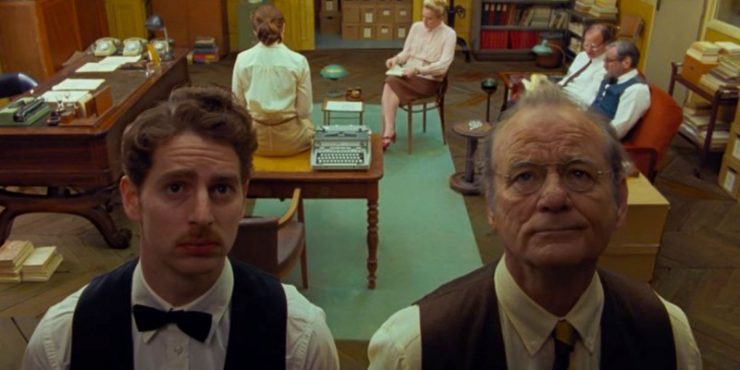With each subsequent film, Wes Anderson has only become more persistent as a practitioner of his singular style. His tableau-style shot framing, sandpaper-dry humor and affected performances are the trademarks that have crested over ten films. The French Dispatch may be his most cinematically ambitious film to date. Expected are the slow-motion tracking shots and the diorama set design, but less so are Scorsese-an dolly shots and entire segments done in Belgian-comic-book-inspired animation. In many ways, its story – which is quite robust, both in scope and plot – is merely a formality; a trojan horse allowing Anderson to force in as many sight gags, cinematic allusions and inside jokes as he can into a single feature. If you can get past all of that, it’s actually quite fun.
The titular French Dispatch is a newspaper which specializes in writer-friendly articles of adventurous subject matter tinged with intellectual curiosity and eccentric characters. Based in the fictional French city of Ennui-sur-Blasé, the newspaper is run and staffed by American expats looking to bring a taste of the larger world to the city of Liberty, Kansas, which is where the paper is distributed. Its editor, Arthur Howitzer Jr. (Bill Murray, one of this film’s many stars making a lot out of little screen time), inherited the paper from his father and transformed it from the flyover state local paper it was into the essential literature it became. Upon Arthur’s death, there are strict rules to end publication and (literally) liquify the presses, but not before his staff can put together one final issue.
Both the printing press setting and the vignette story structure allows Anderson to cast seemingly every actor known to man (even the end credits make fun with the sheer volume of people starring in the movie), employing a wide array of familiar faces. Some of them are giving strong performances, most are there to simply be recognized. Given the stringent nature of his scripts, it is always fascinating to see actors appear for the first time (Benicio Del Toro, Timothée Chalamet and Jeffrey Wright are the most high profile Anderson rookies here), but even more so is it a delight to see the reappearance of old standards (Adrien Brody, Tilda Swinton and the aforementioned Murray). The superfluous amount of name actors is just one more of the film’s visual treats, a flash to distract from the fact they aren’t doing much at all.
So what is a Wes Anderson film when he is motivated less by telling a story and more by crafting homage? It is still incredibly funny. Written by Anderson, but crafted by Anderson, Hugh Guinness, Roman Coppola, and Jason Schwartzman, The French Dispatch is a tightly packed bevy of jokes both visually and woven throughout the dialogue. A twee tone contrasts against the harshness of the characters. Much like The Grand Budapest Hotel, the stories are double – sometimes triple – framed, narrated by their prospective authors.
In the first story, Tilda Swinton plays French Dispatch staff writer J.K.L. Berensen. Her story is about a violent, deranged inmate (Del Toro) who’s inspired by a prison guard (Lea Seydoux) and becomes a world famous painter. Adrien Brody plays a rapscallion art dealer who sees lots of money in investing in him. The second story is by Lucinda Krementz (Frances McDormand), a middle aged single woman who gets caught up in student protests in Ennui, led by a charming chess master (Chalamet) and militant, motorcycle riding revolutionary (Lyna Khoudri). The last and most reflective story is by Roebuck Wright (Wright), detailing his trip to sample the renowned food of police chef (Stephen Park) before becoming entangled in a dastardly kidnapping plot.
Also in roles big and small are Saoirse Ronan, Matthieu Amalric, Lois Smith, Edward Norton, Christoph Waltz, Willem Defoe, and many others. Like previous Anderson films, The French Dispatch has both sex and violence, but manages to be neither erotic nor macabre. His world sits in a bubble, warding off the usual scintillating details that many other films mine greedily. The emotional devastation of The Darjeeling Limited or The Life Aquatic is nowhere to be seen here (though Park’s character is given a monologue near the end of the film that is quite moving). Tonally it probably most resembles Grand Budapest, but even that film hinted at the horrors outside the film’s gaudy veneer. That The French Dispatch bypasses all of that weakens its impact, but it doesn’t seem like Anderson much cares. More than any film he made before, this is ultimately an exercise visual wonder.
I quite enjoyed this movie. Its exuberance outweighed its frivolity. A frivolity, mind you, that The French Dispatch wears on its sleeve. I can see how some may not forgive its overwrought quirk or be turned off by its shameless star-grubbing, but there is still some very impressive filmmaking here. Is there much else? I’ll answer that question with my own: what more do you need?
Directed by Wes Anderson










